措辞的用法diction
- 格式:ppt
- 大小:976.50 KB
- 文档页数:17

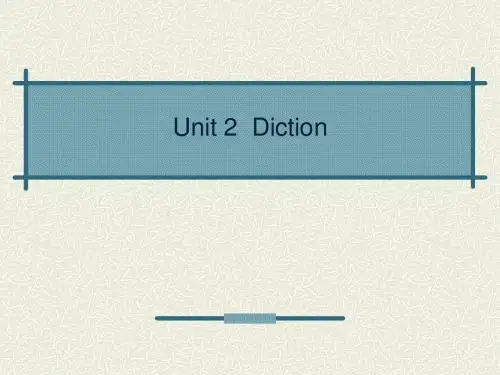
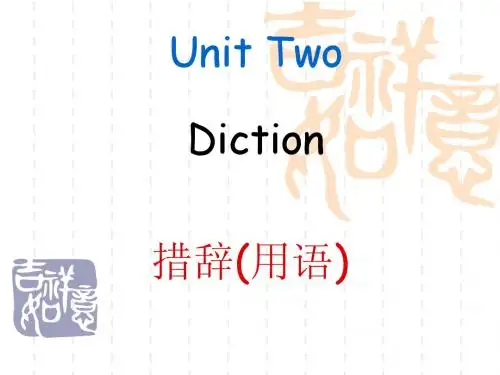
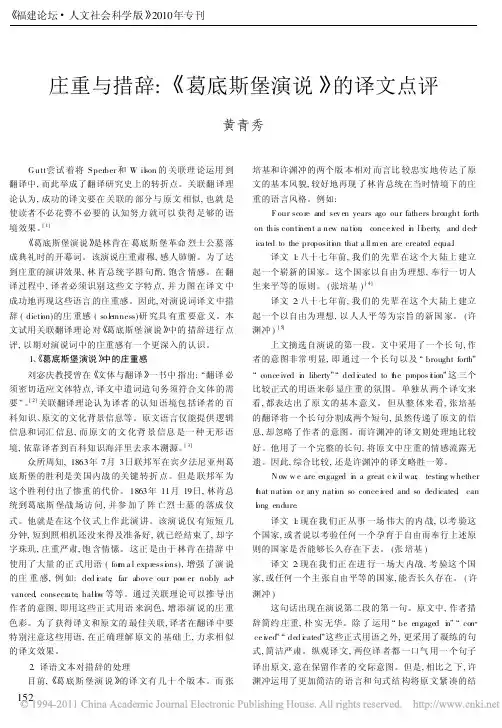
庄重与措辞: 葛底斯堡演说 的译文点评黄青秀G utt尝试着将Sperber和W il son的关联理论运用到翻译中,而此举成了翻译研究史上的转折点。
关联翻译理论认为,成功的译文要在关联的部分与原文相似,也就是使读者不必花费不必要的认知努力就可以获得足够的语境效果。
[1]葛底斯堡演说 是林肯在葛底斯堡革命烈士公墓落成典礼时的开幕词。
该演说庄重肃穆,感人肺腑。
为了达到庄重的演讲效果,林肯总统字斟句酌,饱含情感。
在翻译过程中,译者必须识别这些文字特点,并力图在译文中成功地再现这些语言的庄重感。
因此,对演说词译文中措辞(dicti on)的庄重感(so l emness)研究具有重要意义。
本文试用关联翻译理论对 葛底斯堡演说 中的措辞进行点评,以期对演说词中的庄重感有一个更深入的认识。
1、 葛底斯堡演说 中的庄重感刘宓庆教授曾在 文体与翻译 一书中指出: 翻译必须密切适应文体特点,译文中遣词造句务须符合文体的需要 。
[2]关联翻译理论认为译者的认知语境包括译者的百科知识、原文的文化背景信息等。
原文语言仅能提供逻辑信息和词汇信息,而原文的文化背景信息是一种无形语境,依靠译者到百科知识海洋里去求本溯源。
[3]众所周知,1863年7月3日联邦军在宾夕法尼亚州葛底斯堡的胜利是美国内战的关键转折点。
但是联邦军为这个胜利付出了惨重的代价。
1863年11月19日,林肯总统到葛底斯堡战场访问,并参加了阵亡烈士墓的落成仪式。
他就是在这个仪式上作此演讲。
该演说仅有短短几分钟,短到照相机还没来得及准备好,就已经结束了,却字字珠玑,庄重严肃,饱含情愫。
这正是由于林肯在措辞中使用了大量的正式用语(for m a l expressi ons),增强了演说的庄重感,例如:ded i cate,far above our pow er,nobly ad vanced,consecra te,hall ow等等。
通过关联理论可以推导出作者的意图,即用这些正式用语来润色,增添演说的庄重色彩。
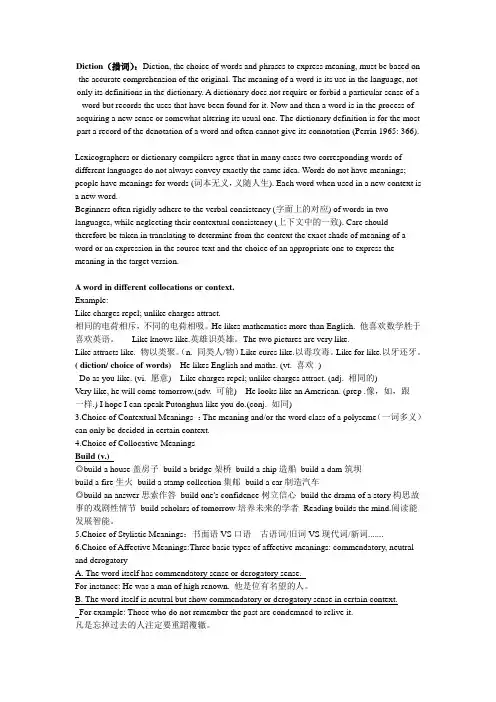
Diction(措词):Diction, the choice of words and phrases to express meaning, must be based on the accurate comprehension of the original. The meaning of a word is its use in the language, not only its definitions in the dictionary. A dictionary does not require or forbid a particular sense of a word but records the uses that have been found for it. Now and then a word is in the process of acquiring a new sense or somewhat altering its usual one. The dictionary definition is for the most part a record of the denotation of a word and often cannot give its connotation (Perrin 1965: 366).Lexicographers or dictionary compilers agree that in many cases two corresponding words of different languages do not always convey exactly the same idea. Words do not have meanings; people have meanings for words (词本无义,义随人生). Each word when used in a new context is a new word.Beginners often rigidly adhere to the verbal consistency (字面上的对应) of words in two languages, while neglecting their contextual consistency (上下文中的一致). Care should therefore be taken in translating to determine from the context the exact shade of meaning of a word or an expression in the source text and the choice of an appropriate one to express the meaning in the target version.A word in different collocations or context.Example:Like charges repel; unlike charges attract.相同的电荷相斥,不同的电荷相吸。
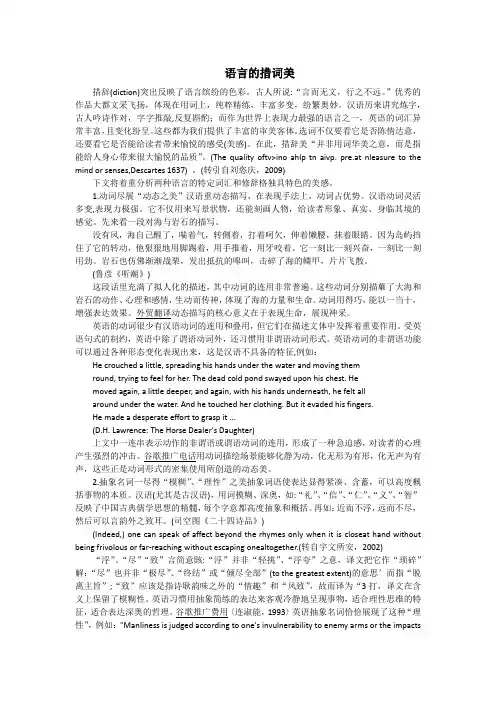
语言的措词美措辞(diction)突出反映了语言缤纷的色彩。
古人所说:“言而无文,行之不远。
”优秀的作品大都文采飞扬,体现在用词上,纯粹精练,丰富多变,纷繁奥妙。
汉语历来讲究炼字,古人吟诗作对,字字推敲,反复斟酌;而作为世界上表现力最强的语言之一,英语的词汇异常丰富,且变化纷呈。
这些都为我们提供了丰富的审美客体。
选词不仅要看它是否陈情达意,还要看它是否能给读者带来愉悦的感受(美感)。
在此,措辞美“并非用词华美之意,而是指能给人身心带来很大愉悦的品质”。
(The quality oftv>ino ahlp tn aivp. pre.at nleasure to the mind or senses,Descartes 1637) 。
(转引自刘恣庆,2009)下文将着重分析两种语言的特定词汇和修辞格独具特色的美感。
1.动词尽展“动态之美”汉语重动态描写,在表现手法上,动词占优势。
汉语动词灵活多变,表现力极强。
它不仅用来写景状物,还能刻画人物,给读者形象、真实、身临其境的感觉。
先来看一段对海与岩石的描写。
没有风,海自己醒了,喘着气,转侧着,打着呵欠,伸着懒腰,抹着眼睛。
因为岛屿挡住了它的转动,他狠狠地用脚踢着,用手推着,用牙咬着。
它一刻比一刻兴奋,一刻比一刻用劲。
岩石也仿佛渐渐战栗,发出抵抗的嗥叫,击碎了海的鳞甲,片片飞散。
(鲁彦《听潮》)这段话里充满了拟人化的描述,其中动词的连用非常普遍。
这些动词分别描蓽了大海和岩石的动作、心理和感情,生动而传神,体现了海的力量和生命。
动词用得巧,能以一当十,增强表达效果。
外贸翻译动态描写的核心意义在于表现生命,展现神采。
英语的动词很少有汉语动词的连用和叠用,但它们在描述文体中发挥着重要作用。
受英语句式的制约,英语中除了谓语动词外,还习惯用非谓语动词形式。
英语动词的非谓语功能可以通过各种形态变化表现出来,这是汉语不具备的特征,例如:He crouched a little, spreading his hands under the water and moving themround, trying to feel for her. The dead cold pond swayed upon his chest. Hemoved again, a little deeper, and again, with his hands underneath, he felt allaround under the water. And he touched her clothing. But it evaded his fingers.He made a desperate effort to grasp it ...(D.H. Lawrence: The Horse Dealer's Daughter)上文中一连串表示动作的非谓语或谓语动词的连用,形成了一种急迫感,对读者的心理产生强烈的冲击。
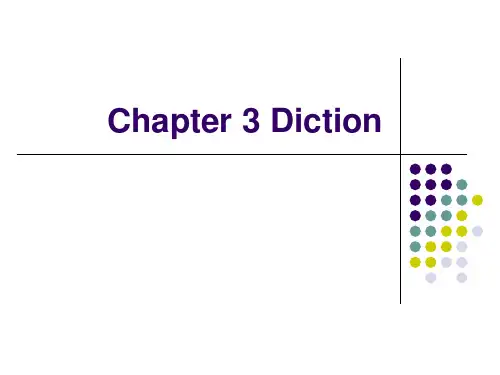
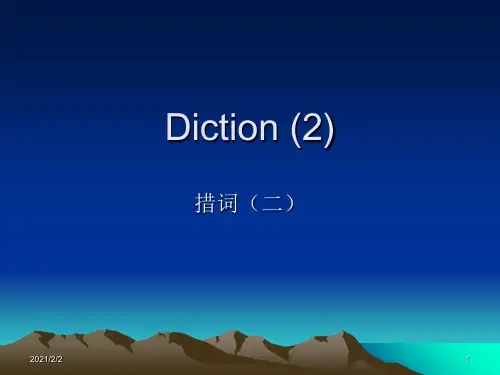

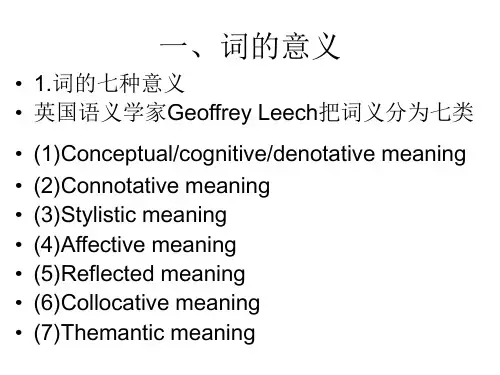
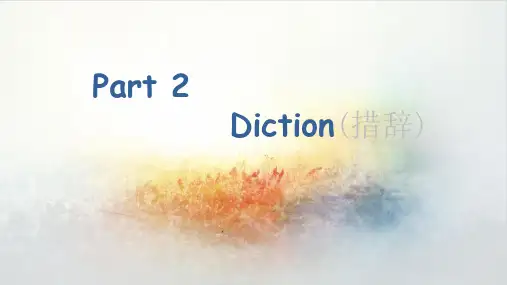
词汇翻译技巧一、词义的选择(Diction)1. 注意词的搭配汉语和英语两种语言在长期使用过程中形成了各自的固定词组和搭配,所以不能把汉语字词的搭配用法生搬硬套到英语译文中去。
汉、英两种语言的动宾搭配也有不同:例:学文化learn to read and write学知识acquire knowledge学外语study a foreign language学鸟叫imitate birds’ crying同样:发展经济develop our economy开发水资源develop the water resources冲洗胶卷develop a film展开说明develop an idea2. 根据上下文正确理解原文的词义有些汉语说法英译是按字面翻译,具体翻译时应视具体语境而定。
例1:有市场、有效益的速度,才是真正的发展,才是硬道理。
译文:Sound economic growth must be based on strong market demand and good economic returns. This is a .注意:“硬道理”也可根据我们中国文化的“异化”理解,翻译成:.例2:这种情况必须改变译文:This must change.分析:此处要正确理解原文的词义。
汉语措辞中的“情况”一词的基本意义与英语中的circumstance, situation, condition等词相近,但是究竟怎样翻译,还需要根据上下文来决定。
二、词的增补(Amplification)词的增补又常叫增译/增词法,是为使译文准确、通顺、达意。
增译有语义性增译修辞性增译,还有注释性增译(文内阐释或文中夹注)1.增补主语汉语中无主语的句子很多,汉译英时要根据上下文的意思选择适当的代词或名词补做主语。
增加什么主语取决于上下文。
例1:知己知彼,百战不殆译:2. 增补非人称的或强调句中的itit可以指天气、时间,还常用来表示强调、代替不定式等。
I. Diction (遣词用字)本章概述本章阐述了翻译中的遣词用字问题。
在分析了英汉词字层次上的五种对应关系的基础上,概述了语言学家们提出的英语词义辨析的四种基本方法和英语词语翻译的常用技巧.并对汉译英的遣词用字问题做了探讨。
遣词用字是任何翻译工作者自始至终需面临的一个现实问题。
由于英汉分属不同的语系,所以在翻译时源语与译语之间往往没用相对固定的词义对应关系。
本章用对比的方式归纳了英汉词字层次上的五种对应情况:1.完全对等,2.多词同义,3.一词多义,4.词义交织,5.无对等词语。
词义辨析是遣词用字的前提。
本章从四个角度探讨了如何判断某一英语词语的准确含义,即l.根据构词法辨别词义;2.根据指代关系辨别词义;3.根据上下文或词的搭配辨别词义;4.根据不同学科或专业类型辨别词义。
在词义辨析的基础上,本章归纳了英语词语翻译的八种常用技巧:1.推演法;2.移植法;3.引伸法;4.替代法;5.释义法;6.合并法;7.图形法;8.音译法。
汉译英的遣词用字问题与英译汉的情况有所不同。
英译汉时译者输出的是自己所熟悉的汉语词汇、语法结构,很多表达法早已在头脑里形成了概念,只需译者一一甄别、作出取舍即可;而汉译英则需从一大堆我们不那么熟悉的词语中去寻找答案一一这也解释了为什么人们普遍认为,在同一档次的翻译上,汉译英的难度要大大超过英泽汉。
By“diction”we mean the proper choice of words and phrases in translation on the basis of accurate comprehension of the original.In the practice of translation,what perplexes us most frequently is how to find an equivalent in the language to be translated into.Great care is called for in the translation of“familiar”English words into Chinese,as their meanings vary with the Change in collocation or context.Take the following simple sentence for example:* Tension is building up.Without context,both “tension”and "build up" may have various explanations.Thus this English sentence may be translated into different Chinese expressions accordingly:·形势紧张起来。
专四写作措辞与语句DictionandsentenceDictionChoice of wordsDictionI Choosing wordsII. Words to AvoidIII. Overcoming ChinglishProper words in proper places make a true definition of style. Jonathan Swift ?Use the right word, not the second cousin.The difference between the right word and the almost right word is the difference between lightening and the lightning bug. Mark Twain :语不惊人死不休Du FuWords should be only the clothes, carefully custom-made to fit the thought. Jules Renard ?We should endeavor to use words that correspond as closely as possible with what we feel, see, think, imagine, experience and reason.GoetheI Choosing wordsChoosing the appropriate and exact wordsA. Levels of wordsB. Meanings of wordsC. General and specific wordsI Choosing wordsA. Levels of wordsa. from a stylistic point of view: formal/learned, common and colloquial (slang words, dialectal words and certain words that are often used by uneducated speakers)b. standard and nonstandard (or substandard words)B. Meanings of wordsa. denotation/literal meaning本义the direct, explicit meaning or reference of a word or a term (Webster’s New Word Dictionary)b. connotation/associative meaning转义Idea or notion suggested by or associated with a word, phrase, etc. in addition to its explicit meaning, or denotationI Choosing wordsCompare:Tom is ambitious/ tough-minded/ foresighted/ firm/ self-respecting/ persistent.Tom is pushy/ ruthless/ calculating/stubborn/egotistical/ nagging.country, nation, state, landask, question, interrogatetime, age, epochlarge, bigthrifty, frugal, stingymodest, humbleslender, slim, emaciatedThese words can be called synonyms but may be different in stylistic level, in the degree ofemphasis, in emotional coloring, in tone and in collocation.Mind:Very often an English word has no exact Chinese equivalent and it has to be translated in different ways in different contexts.Choices1. A few listeners were uninterested/ disinterested and dozed off.2. Though she has grown up, her behavior is oftenchildlike/childish.3. Her clothes, though made of cheap/inexpensive material, are quite elegant.4. Is that old/elderly woman/lady sitting by the window your mother?5. I am sorry to refuse/decline your kind invitation.6. This homely/ugly old man is a well-known composer.7. This servile man was especially humble /modest when he was talking with his superiors.8. My father became stout/fat as he grew older.9. I can never forget the little/small town where I spent my happy childhood.10. The modernization programme has won the support of the whole nation/country.C. General and specific wordsProfessionals-----scientists, doctors, teachers lawyers, journalistsscientists-----physicists, chemistschemists---biochemists ?Compare:Fido is the most lovable creature I know.Fido is the first animal I ever liked.Fido is one of our three dog s.Fido is the fastest hound I have ever seen.We have three hounds: a dachshund(德国种小猎狗) named Willy, a gray hound named Mick, and a basset(短腿猎犬) named Fido.由一般(general)趋于特定(specific)Specific words are much more concrete and colorful than the general ones; they seem to make the reader see, hear, smell, touch or feel what the writer wished to describe. They help tomake writing clear, exact, vivid and striking, for they are more informative and expressive than general words. General words convey a kind of emotion (love), condition (misery), thought (democracy), theory (evolution), science (biology) or a group of things (creature, plant, organism).Too many specific words may result in difficulty in grasping the main idea while too many general words may cause the writing to be dull and difficult.由一般(general)趋于特定(specific)Abstract and general words are indispensable, and the accomplished writer can take advantage of both, can move back and forth between the language of ideas and the language of hard realities.由一般(general)趋于特定(specific)1. a. She loves flowers.b. She loves roses and chrysanthemums.2. a. A few houses were destroyed yesterday.b. Five houses were burnt down yesterday.3. a. If a person is reading his love letter, you must not lean over his shoulder to read it.b. If a person is reading his love letter, you must not lean over his shoulder to share it.4. a. It grew dark before seven o’clock. The wind was strong and the rain was heavy.b. It grew dark before seven o’clock. Wind and rain whipped the house.5. a. An elderly man had collapsed while crossing the street, and an ambulance took him to a hospital. ? b. An elderly man had collapsed while crossing the street, and an ambulance rushed him to a hospital.6. a. Trees surround the water near our summer place.b. Old elms surround the lake near our summer cabin.See if you can create clearer pictures from these sentencesA car was parked in the street.Some children stood anxiously at the counter.Our friends have a place at the shore.The table was cluttered with his things.A man was standing at the corner.She bore a great burden.A shiny red Mercury convertible was parked against the curb near a hydrant.Four little urchins in ragged blue jeans stood with their smudgy faces pressed against the candy counter.The Rothblums have a two-bedroom bungalow a block from the ocean in Brandt Beach, New Jersey. ?Jeff’s notebook, books, and baseball glove cluttered the diningroom table.A tall, lanky farmer in faded overalls and a battered straw hat was leaning against the mailbox on the corner of Main Street and First Avenue.After her mother died, Sylvia helped raise her younger brothere and cared for her ill father.Compare:1) We experienced difficulty in that situation.2) The cartilage in my ankle ripped painfully as I slammed onto the icy sidewalk. As I lay on my back, cursing myself for jogging in subzero weather, the chill of the morning wind made me shiver. I tried to raise my body but my ankle would not move, and all I could do was fall back on my concrete bed. I felt nothing, but pain, cold and dismay.Provide specific words for the following general words:brightly-colored red, scarletSlowly two miles an hourRun sprint, dash, gallop, race, dart, trot,scurry, scamper, lopeWalk amble saunter trudge drag strolltiptoe clump slouch prance tramptotter trot wade waddle shuffleswag swagger mince stride strutstagger hobble limp plod stumbletoddle loiter lurch sneak padProvide specific words for the following general words: A good man Good foodHouseLaughBeverageSeeSayWalkSkilfulHitWeaponBigSmallBraveProvide specific words for the following general words: AfraidComplainPleasedTrueStubbornFlexibleThinFatNoiseSilenceBeautifulUglyActiveInactive由模糊(vague)趋于明确(definite)1.a. It was a dreadful journey.b. It was a tiring, tedious and dangerous journey.2. a. Although the commander had an awful temper and a terrible voice, he showed wonderful care for his men.b. Although the commander had a fiery temper and a gravely voice, he showed fatherly care for his men.由模糊(vague)趋于明确(definite)Lazy adverbs (懒散副词)Absolutely, awfully, dreadfully, terribly, terrifically, frightfully, horribly, desperately, fiercely, badly, hugely, simply, wildly, jolly, right, pretty, precisely, mighty, marvelously, tremendously, wonderf ully…CompareThe beggar was awfully thin. /The beggar was pitifully thin.My new teacher is absolutely handsome. /My new teacher is strikingly handsome.My supervisor’s tone is very critical. /My supervisor’s tone is sharply critical.It is terribly hot today. / It is burning hot today.We had a wildly cold night. / We had a freezing night.由抽象(abstract)趋于具体(concrete)1. a. Mr Bunney looked at the vegetables before him.b. Mr Bunney gazed dismally at the vegetables before him.2. a. The man was standing under a tree.b. Jim Jones, our village postman, was walking under a large oak-tree.3. a. The cable consists of many wires.b. The cable consists of 100 strands of very fine copper wires.4. a. He had a misfortune while swimming.b. A shell fragment ripped open his right arm while he was swimming.5. a. Tom is a lazy boy.b. Tom usually sleeps late in the morning and does little work after he gets up.由抽象(abstract)趋于具体(concrete)LookShe spotted him immediately among the people in the railway station, because he was wearing his yellow hat.The men in the boated sighted land.They were observed entering the bank at 8:30.Several possible buyers are coming to view the house.He scanned the pages of the book to what it was about.He witnessed the accident himself; he saw it all.She glanced down the list of names.Stop eyeing me like that.She peered through the mist, trying to find the right path.He gaped at her in surprise.D. Using idiomsAn idiom is a fixed group of words with a special meaning which is different from the meaning s of the words that form it.Common types of idioms:Phrasal verbs put up with, look forward to, carry onN.+ prep. + n. a straw in the wind, the apple of one’s eye, like a fish out of waterPrep. +n. on the air, at length, at large, in person, with flying colorsV. +n. slip one’s mind, go to the dogs, stew in one’s own juice, teach an ol d dog new tricks, teach one’s grandmother to suck eggsAs…as as big as life, as poor as church mouse, as mute as a fish, light as a feather ?Pairs of words in black and white, sink or swim, high and dry, touch and goSayings Don’t count y our chickens before they are hatched.A stitch in time saves nine. One man’s meat is another man’s poison. Tastes differ. Each dog will have his own day.Idioms in sentencesThe first American presidential dark horse was James Polk.You can’t tell how she feels, she doesn’t wear her heart on her sleeve.John could not go to a library, and writing the report was a job of making bricks without straw.?The quickly-called meeting of the President and his cabinet was a straw in the wind.Although it is a small nation, it is a formidable opponent, for it is armed to the teeth.John said he was more interested in the competition itself than in the prize. Obviously it was sour grapes to him.Don’t waste time here, talk turkey please or I’ll go.Profit is generally the apple of discord among capitalist nations.Mum said I’d better leave the kitchen because she did notneed my help and I was like a bull in a china shop there.Although Jack is thought to be the contestant most likely to win the gold medal, David and Harry are among the dark horses.Idioms in sentencesThough Henry Adams found Cambridge a ―social desert‖, it flowed with intellectual milk and honey.?He would not have met his Waterloo if his courage hadn’t failed him.It rained cats and dogs yesterday evening.He was threatened with a beating by a fellow who was an ass in a lion’s skin.He blows hot and cold about making friends, so he has few close friends.I believe t his will prove to be a Pandora’s box in the long run.Ever since he entered this school, he has always been the apple of the teacher’s eye.How many times do I have to tell you not to leave you homework till the eleventh hour??Judging from the way he spends money, he was born with a silver spoon in his mouth.Idioms in sentencesWhen the police began to investigate, five of the man left the country, leaving the sixth holding the bag.Jack seems to be wasting away. He is nothing but a bag of bones.If you break a window, do not pass the buck; admit that you did it.Your life in this town has been an open book,--perhaps too open.Bob’s unexpected visit played the devil with our own plans to travel.To give the devil his due, old Simpkins, miser though he is, has always been generous to Joy.He has then completely under his thumb. They don’t dare t o defy them.When she is around, he is nervous and seems to be all thumbs.Don’t talk about vanity in my brother’s hearing; it is his Achilles heel.Having already heard that Helen is an avid mountain climber, I broke ice by talking about our favorite sport.Mind:Most idioms are informal or colloquial in style and can be used in conversation; but a few are slang and should be used with care. Many idioms have become clichés and are no longer fresh or interesting and should be used sparingly.II. Words to AvoidA. Jargon(1) When I asked my parents if I could use the car, the feedback was negative.(2)Upwardly mobile young lawyers often work 70 hours a week.If you do have to write professional articles for common readers, you cana) use a certain number of technical terms with interpretation or definitionb) refer to the following passage:If we become free of disease, we would make a much better run of it for the last decade or so, but might still terminate on about the same schedule as now. We may be like the genetically different lines of mice…programmed to die after predeterminednumber of days clocked by their genomes. If this is the way it is, some of us will continue to wear out and come unhinged in the sixth decade, and some much later, depending on genetic timetables.Words to AvoidB. Big words / Pretentious wordsGobbledygook –pompous, official-sounding language which use twenty words to express a three-word thought.GobbledygookUndesirable waste material is removed on a semiweekly basis by municipal employees specially assigned to such activity.Personnel are requested to extinguish illumination before departure from these premises.The causal factor of her poverty becomes obvious when one considers the number of offspring she possesses.It is my fervent wish that the creator of the universe will do his utmost to preserve and protect the royal lady who graciously occupies the position of the head of state.ImprovedCity collectors pick up garbage twice a week.Please turn out the lights before leaving.She is poor because she has too many children.God save the queen.Words to AvoidExercise(1) Were it not for the lucrative financial rewards, she should have tendered her resignation.(2) Large-size passenger vehicles utilize excessive quantities of fuel.(3) Years of research have impacted positively on ourunderstanding of cancer.(4) The very thought of flying made her paranoid.Notice how the simple vocabulary in the following examples express the ideas more clearly and precisely than do the ―big words‖Words to AvoidC. Clichéstrite expressionsexpressions that have been used so often that they are no longer effectiveClichésNotice how much more effective the following simple, straightforward expressions are than the clichés.A list of the most common clichésApple of one’s eyeBaker’s dozenFace the musicFew and far betweenGet up on the wrong side of bedHit the nail on the headIn the same boatNip in the budNo love lostOne foot in the graveA list of the most common clichésRadiantly happyRain or shineRaining cats and dogsSnake in the grassTempest in the teapotTwinkling of an eyeSupreme sacrificeThe man in the streetSell like hot cakesOut of the woodsIn the final analysisAll in allAs a matter of factNoticeIt is not necessary to memorize all clichés or eliminate them entirely from your prose. Both tasks would be impossible. The clichés to watch out are the ones that recur in your w ork as all-purpose filler.Words to AvoidD. SlangRefers to a kind of colloquialism, characterized byA> eccentric humorB> forced, fantastic or grotesque meaningsC> noveltyD>attempts to be colorful, fresh and vividSome examples of slang ISome examples of slang IINoticeSome slang words or expressions may, through wide circulation, become acceptable in standard English, such as mob, highbrow, cop. Much slang, however, goes out of fashion very quickly through overuse and may be entirely forgotten in a very short time.In short, it is inappropriate in serious and formal writing because it is too vague and makes the writer sound offensive andfunny.ExamplesOn hearing that his father had kicked the bucket, we wrote him a letter to express our sympathy. ?The big banquet held in honor of the distinguished guests was really neat.III. Overcoming Chinglish中式英语Chinglish (that misshapen, hybrid language that is neither English nor Chinese but that might be described as ― English with Chinese Characteristics‖.--------Joan PinkhamIII. Overcoming ChinglishSome examples of the wrong use of wordsThey stood on top of the hill, attracted by the beauty of the garden city.They had no basis of feeling.他占有欲与生俱来。